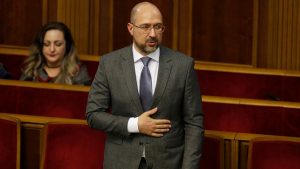
The Cabinet of Ministers of Ukraine at a meeting on August 5 approved the State Strategy for Regional Development for 2021-2027.
“The document was prepared by the Ministry of Regional Development. This important document is filled with new content, European approaches to the development of regions. I see this as one of the vectors of our movement and direction to the European Union,” Prime Minister of Ukraine Denys Shmyhal said during the meeting.
He added that the document took into account the issue of a new administrative-territorial structure, while stressing that there is no talk of any liquidation of some of the social infrastructure facilities.
According to the presentation of the strategy made by Minister of Communities and Territories Development Oleksiy Chernyshov, new functional types of territories were identified, as well as regions that are in the focus of regional policy: the mountainous territories of the Carpathians, the coastal zones of the Black and Azov Seas, nature reserves, border areas, including those on the contact lines, rural areas in unfavorable conditions, agglomerations, centers of economic growth, mono-functional cities, as well as temporarily occupied territories. For each functional region, the ministry has identified important development aspects.
The Ministry of Regional Development also began developing plans of measures to implement the strategy for the next three years, as well as aligning regional strategies. In addition, a draft law has been prepared on reforming the State Fund for Regional Development to finance the implementation of the state strategy.
“To achieve the set goals, the targeted use of funds from the state budget is critically important. Therefore, it is necessary to improve the system of financing regional development, including at the expense of the State Fund for Regional Development,” Chernyshov said

Prime Minister Denys Shmyhal during Freedom of Speech of Savik Shuster program on Ukraine TV Channel later on Friday presented a brief strategy of gradual weakening of the quarantine for the period from early May by early July.
He also promised to report a more detailed plan, which is now being drawn up, in three or four weeks.
“This plan is under work, in fact we are working over it round the clock. As soon as it is ready and improved, it will be immediately presented to the public. Believe me, it would be one of the best [plan] among our neighboring states. It has credit holidays, and refinancing of loans, support for poor and unemployed,” the premier said.
According to his brief strategy, the first quarantine step called “Ukraine is going to work” is foreseen for early May – early June.
It involves the creation of 500,000 jobs, credit support for small and medium-sized businesses, partial removal of restrictions on public transport and a shifted work schedule.
The second stage named “New standards of social life” is scheduled for early June-early July.
During this period, it is planned to complete the 2019-2020 school year, restore the operation of public transport according to the new rules, allow access to recreation areas, subject to safety standards, and to weaken isolation conditions for older people.
Shmyhal emphasized that while Ukraine should adhere to the emergency regime in order to pass the epidemic according to the optimistic scenario with a drop in GDP to 5%, and not according to the pessimistic one, in which GDP fall is estimated at 15%.
In this emergency mode, according to the presentation presented by the prime minister, it is planned to support socially vulnerable segments of the population, to help the unemployed and those on forced leave, to mobilize medical resources and to support the medical staff and all those involved in the fight against the epidemic.

PJSC State Export-Import Bank (Ukreximbank, Kyiv) and McKinsey and Co. Ukraine LLC on December 16, 2019 signed an agreement on advising regarding the drafting of the bank’s development strategy for 2019-2023, according to information in the ProZorro e-procurement platform.
The price of the services, which according to the documentation must be provided before December 31, 2021, is EUR 960,000. The cost of advising services for developing the strategy, in particular, is EUR 84,000, and if the bank’s supervisory board approves the strategy developed by the company, the amount will increase by another EUR 120,000.
Ukreximbank, the sole owner of which is the state, was created in 1992. The net profit of the financial institution in January-September 2019 amounted to UAH 2.27 billion, which is 2.2 times more than in the same period in 2018 (UAH 706.24 million).
According to the National Bank of Ukraine, as of October 1, 2019, the bank ranked third among 76 banks operating in the country in terms of total assets (UAH 205.439 billion).

President of Ukraine Volodymyr Zelensky at a meeting with the delegation of the European Bank for Reconstruction and Development (EBRD), led by its president Suma Chakrabarti, has assured that bilateral cooperation will be intensified and will become more efficient. “We thank you for being here and thank you for being the largest investor in Ukraine. I want to assure that we will extend our cooperation,” Zelensky said at the meeting.
He stressed that the strategy of the EBRD is fully consistent with the priorities of Ukraine, and expressed conviction that Ukraine and the bank together can work more efficiently. Zelensky noted that the country appreciates cooperation with the international partners: the EBRD, the World Bank and the International Monetary Fund.
The president noted he had already met with the representatives of the IMF, at which Ukraine’s progress in fulfilling its obligations under the Stand-By Arrangement was noted. According to Zelensky, the parties discussed the issue of continuing cooperation.